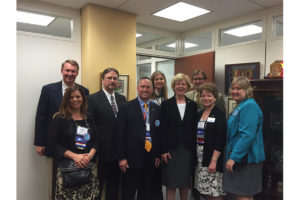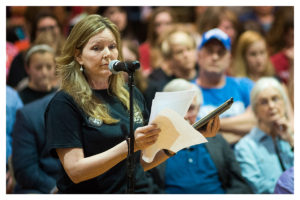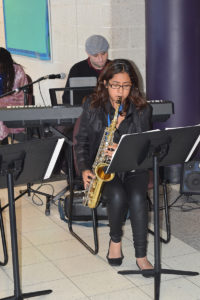With ESSA as a guide, education accountability plans will be developed at the state and local levels. Many states are at different points in the process. Get ideas from the front-runners.
 Music educators and advocates across the country celebrated in December 2015 when President Barack Obama signed the Every Student Succeeds Act (ESSA) into law. For the first time, music was specifically mentioned as one of the elements of a well-rounded education, meaning that music programs could be eligible for funds and resources that were previously off limits.
Music educators and advocates across the country celebrated in December 2015 when President Barack Obama signed the Every Student Succeeds Act (ESSA) into law. For the first time, music was specifically mentioned as one of the elements of a well-rounded education, meaning that music programs could be eligible for funds and resources that were previously off limits.
“There was euphoria through the music education community when this hit,” says Chris Woodside, deputy executive director of the National Association for Music Education’s (NAfME’s) Center for Advocacy, Policy and Constituency Engagement. “This was a huge historic milestone for music education in America. It is incredibly symbolic that this happened.”
Unfortunately, government works slowly, and although ESSA is the law of the land, the federal government has yet to pass an accompanying appropriations bill to fund the significant changes and new programs needed across the country.
Leaving Behind “No Child Left Behind”
ESSA is the reauthorization of the Elementary and Secondary Education Act, replacing No Child Left Behind (NCLB). Critics of NCLB felt it focused too much on standardized testing and national standards. ESSA gives more control back to the states to determine their own definitions of success and emphasize testing less.
“There’s sort of this migration and phasing out of No Child Left Behind and replacement of that bill with pieces of ESSA,” Woodside says. “The whole package can’t come into play until all the funding has taken place.”
As NAfME and other lobbyists work with legislatures to obtain the $1 billion needed, states are beginning to interpret what ESSA means for them. “[ESSA is] not a mandate,” Woodside says. “It doesn’t say you must have a music program in every school. Basically, what it’s telling states is that music should be considered a priority.”
Get ideas and inspiration from three different states that have started the ball rolling on implementing ESSA.
 Town Hall Triumph
Town Hall Triumph
Kentucky’s Commissioner of Education, Dr. Stephen L. Pruitt, is working to create a new accountability plan on a timeline that includes a lot of room for public input. “The Every Student Succeeds Act provides Kentucky with incredible opportunity here to bring all shareholders to the table to create a system that not only holds schools and districts accountable for students’ education but also celebrates good things happening in our schools,” Pruitt says. “Together we will create a new system that will ensure we do the very best for all our kids and provide them with a well-rounded education.”
Pruitt was one of the first state education chiefs to hold meetings for public input on what people wanted to see as part of the new accountability system under ESSA. More than 3,000 people total attended a series of 14 Education Town Hall Meetings in different state regions and one digitally. Many participants expressed their desire for arts inclusion to Pruitt, whose own two children went through six years of band.
“[I am] touched to hear support for music education,” said one music teacher from Hazard, Kentucky. “We don’t know what our students are facing when not at school. Music education provides an opportunity to get to know students and love them and provide belonging.”
Many current and former students also attended the meetings. “[We should] consider arts being measured in our accountability system; you can’t count music with a point system,” said a student from Bowling Green, Kentucky. “Music changed my life. Music is the only program in school that can truly teach teamwork. No one is on the sidelines in a band. Everyone works together.”
Currently, Pruitt and various work groups are finalizing a proposal for the new accountability system that will then be released for public feedback. Their ideal timeline has the new system in use by August 2017.
Drive-In Meeting
The Wisconsin Music Educators Association (WMEA) is leading the push for a new piece of legislation that would make sure the well-rounded education part of ESSA—and thus music education—is implemented in a new state accountability plan.
“There’s an incredible amount of latitude about how [ESSA] is implemented in every state,” says Brad Schneider, WMEA government relations chair and recently retired band director. “The WMEA is currently searching for [a legislator to sponsor] a bill that would include four bullet points.”
The four points include:
• Inclusion of ESSA’s well-rounded education definition that includes music.
• Access to and participation in music and arts education as an indicator on school report cards.
• Recommendations for early childhood music education.
• A requirement for content area specialists to teach music and arts programs.
Over the summer, the WMEA held training sessions to teach their members more about ESSA and how to meet with their local politicians.
“A lot of it is just telling them that you do not have to be nervous talking to your state legislator; they’re just a person that is from your community,” Schneider says. “The legislators by and large want to talk to you, and most of them make themselves available to their constituents.”
Regardless of the progress made on obtaining sponsorship and writing the bill, the WMEA is planning a “Drive-In Day” in February. Music educators from around the state will gather in Madison, Wisconsin, for a training session followed by a walk to the state capitol building to meet with their local representatives and discuss either the new bill or music education and ESSA in general.
 The Next Generation
The Next Generation
Prior to the passage of ESSA, Connecticut was well into drafting and adopting its Next Generation Accountability System. Already, the state legislature had included a whole child approach very similar to ESSA’s well-rounded education and added an indicator or measure of music education access in high schools.
“Arts [education] doesn’t need justification or validation in terms of its impact on academic achievement,” says Ajit Gopalakrishnan, chief performance officer of the Connecticut State Department of Education. “Arts education for the sake of arts is what makes us who we are. That was the commitment for inclusion of the arts indicator in the accountability system. It wasn’t just the fact that the arts have been shown to impact academic achievement. That’s great, but that’s not the only reason why we’re looking at the arts.”
Although the formal accountability system only measures high school access for data collection reasons, state law already requires arts education in all grades, and the State Board of Education has arts standards mirroring the National Core Arts Standards.
When ESSA did pass, much of the system already fit in well with the Next Generation system—allowing those in the field to take even further steps such as studying arts equity across different state regions and studying what new funding may be available under ESSA’s eventual appropriations.
“There’s a lot of excitement about hearing more and more about ESSA and what might be possible for schools and how funding might be able to support some programming down at the ground level,” says Jacqueline Coleman, education consultant for the arts with the Connecticut State Department of Education.
What Can I Do Now?
The passage of ESSA was an exciting milestone for music education advocates, but implementation and funding is where the hard work really begins. Teachers, parents, and even interested students can educate themselves about ESSA on NAfME.org’s frequently updated “Everything ESSA” page.
“If you want to be involved, this is the time to learn because we’re at the absolute beginning of the process,” Woodside says. “By understanding the bill now, by becoming the best [policy wonk] teachers out there, music educators can learn how to use what’s in the bill and not allow the bill to dictate to them how it will be implemented.”
Find out what’s happening in your education departments or state music education associations and meet with your representatives at any level to make sure they know about ESSA, the well-rounded education language, and why music education is so important to you.
“I personally believe that visibility is the precursor to advocacy,” Coleman says. “Making the students work, so that it’s not just about banging on the door when you have to but having a healthy presence of the arts in the community, so that people would miss it if it was gone.”
What Is “Well-Rounded”?
“The term ‘well-rounded education’ means courses, activities, and programming in subjects such as English, reading or language arts, writing, science, technology, engineering, mathematics, foreign languages, civics and government, economics, arts, history, geography, computer science, music, career and technical education, health, physical education, and any other subject, as determined by the State or local educational agency, with the purpose of providing all students access to an enriched curriculum and educational experience.”
– Title VIII, Sec. 8002, 53 of Every Student Succeeds Act


